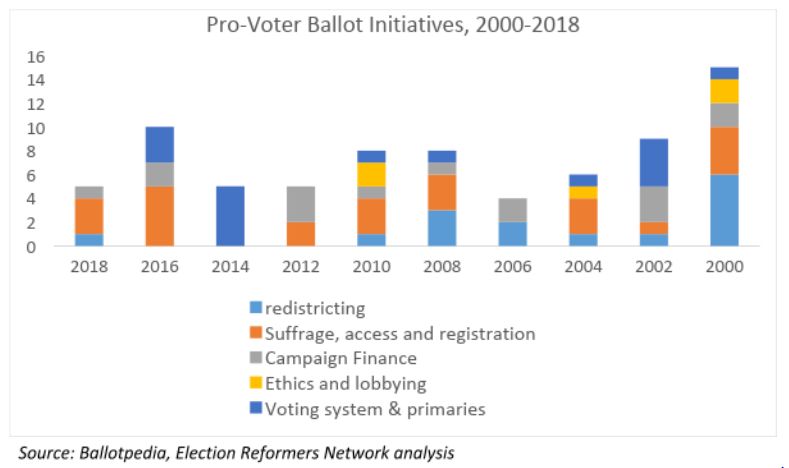Forget Red Wave, Forget Blue Wave, This is The Best Year for Pro-Voter Election Reform in 50 Years

Amid all the divisive ugliness inside the Beltway, here is some good news: 2018 may well be the best year in a half century for election reform. Today’s narrative laments a crumbling democracy, alienated voters, and a political culture spiraling ever downward.
While true, that narrative is incomplete. It misses the remarkable energy building across many states to confront these problems, shore up our democracy, and rebuild our political culture.
Nowhere is that energy more apparent than in the election reform measures on the ballot this year, many initiated by citizens and all empowering citizens to make important changes to our rules and our elections.
In June, Maine voters sustained the powerful innovation of ranked choice voting, which is now being used for the first time in our history for congressional election. In November, 12 states vote on 15 ballot initiatives, which if passed will enact more than 20 important reforms.
Pro-voter measures are on the ballot from North Dakota to Florida, from Nevada to Massachusetts, in states that are deep red, deep blue and many shades in between. More than 2.1 million people signed petitions to bring theses reforms to the ballot.
Four states will consider whether to establish nonpartisan or independent redistricting (common in other democracies) to curtail partisan gerrymandering.
Ohio passed such a measure overwhelmingly in May, and Colorado, Michigan, Missouri, and Utah may follow suit in November.
Two states, Nevada and Michigan, will vote on automatic voter registration, which has won bipartisan support and significantly increased registration in other states, while increasing the accuracy of voter rolls. Maryland will vote to establish Election Day registration.
North and South Dakota will both vote on a range of provisions to increase campaign finance transparency, restrict lobbying, and strengthen ethics and accountability. Florida will have the chance to restore voting rights to people with felony convictions, and Massachusetts to prepare a constitutional amendment to address money in politics.
For historical context, no year has seen this many pro-voter ballot initiatives since the early 1970s, when many states reduced minimum voter age in the context of the Vietnam War. The table below shows this year’s reforms in recent electoral history.

Several of this year’s reforms are enjoying the kind of bipartisan support that is often said to be lacking in American democracy.
In Colorado, for example, Democrats and Republicans initially clashed over conflicting approaches to redistricting reform, but negotiated a compromise state amendment proposal that passed both houses unanimously and is favored to win in November.
In Utah, top Republican and Democratic strategists have joined an anti-gerrymandering amendment campaign that centers on images of Ronald Reagan, a strong critic of gerrymandering.
In Florida, polls show 71% of all voters, and strong majorities from both parties, support expanded voting rights.
This historic year in ballot measures parallels pro-voter activity by state legislatures. Laws were enacted this year to facilitate voter registration in nine states, including by Republican legislatures in South Dakota and Utah.
California and Washington both enacted major state level voting rights laws, and Connecticut became the 12th state (including the District of Columbia) to join the National Popular Vote Interstate Compact, which if passed by a sufficient number of states, will establish presidential election by popular vote.
There is, of course, some degree of countervailing activity and opposition to these measures. In contrast to the 15 pro-voter ballot initiatives this year are two constitutional amendment measures establishing voter ID requirements, which will be on the ballot in November in North Carolina and Arkansas.
In Michigan and Missouri, state chambers of commerce are leading well-funded efforts to stop redistricting reform.
North Dakota’s ballot measure establishing a state constitutional right to know the sources of campaign spending is battling a wave of dark money.
In aggregate, however, pro-voter ballot campaigns have raised significantly more money than their opponents and most appear to be ahead in the polls.
This state-level reform activity hasn’t received a lot of media attention, in part because it falls short of the sweeping national change many are clamoring for. But bottom-up is how reform usually happens in the U.S., led by our state “laboratories of democracy,” and only taken up nationally when a critical mass of activity is reached.
The half-century peak in state level reforms this year is the best indicator we could ask for that major national level reform is not far behind.
Editor's Note: This article was co-written by FairVote Executive Director Rob Richie and Kevin Johnson, executive director of the Election Reform Network. It has been republished with permission from the authors.
Photo Credit: Macrovector / Shutterstock.com





